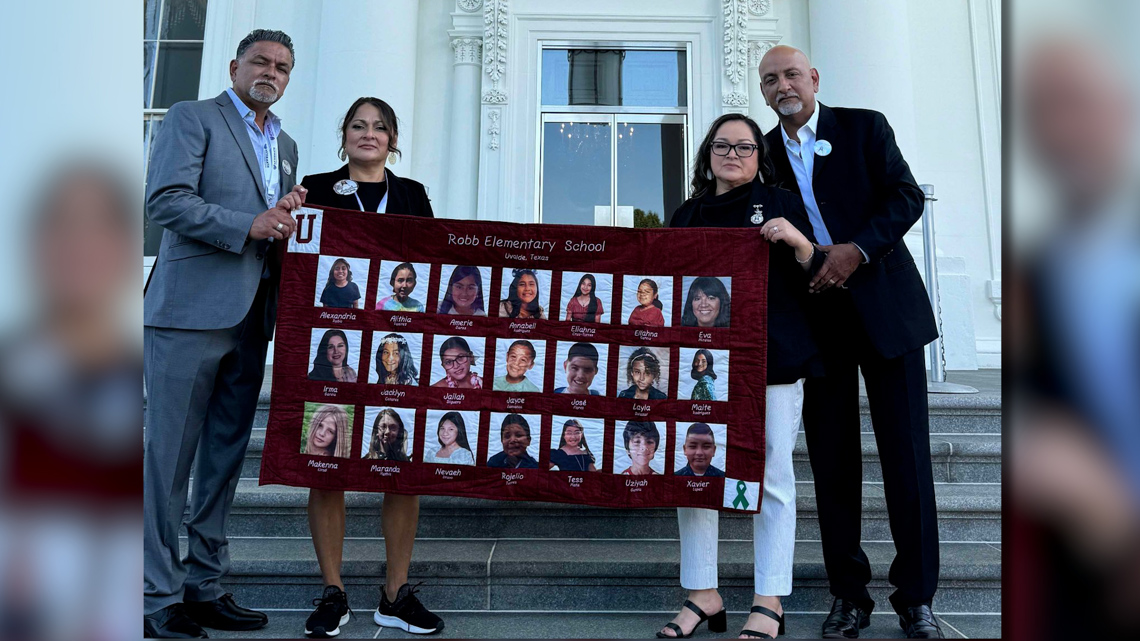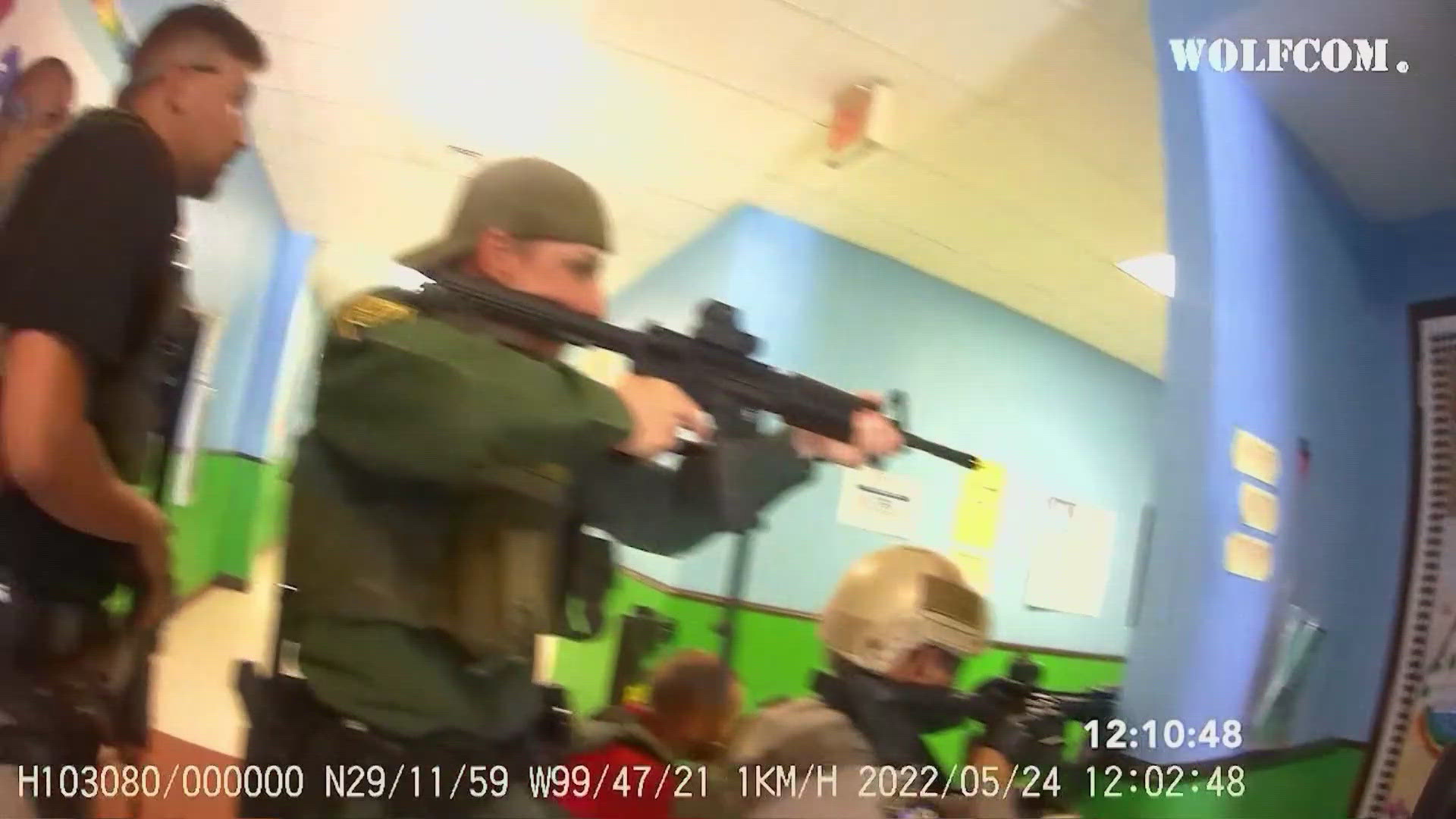SAN ANTONIO — An investigation conducted by U.S. Customs and Border Protection cleared the 188 Border Patrol agents who responded to the scene of the Robb Elementary Shooting in May 2022 of any wrongdoing.
The findings of that investigation, revealed in a 203-page report Thursday – more than two years after 19 students and two teachers were killed a gunman at the Uvalde school – found that "none of the CPB personnel operating at the scene were found to have violated any rule, regulation or law, and no CBP personnel were referred for disciplinary action."
The investigation involved more than 200 interviews with personnel and reviews of "thousands of hours of videos," CBP's statement said.
Of the 23 agencies that had a presence at the shooting scene, none had a bigger contingent than Border Patrol. The next-closest agency was the Texas Department of Public Safety, which had 91 Troopers at the scene. It's worth noting that the Texas House Committee's report from July 2022 said 149 Border Patrol agents responded to Robb.
While CBP's investigation resulted in no discovery of wrongdoing, the report, like others created in the wake of the Uvalde shooting before, said there was "no established command and control framework" at the scene.
Pete Arredondo, the former Uvalde schools police chief who was fired in the wake of Uvalde, is mired in criminal proceedings after he said previously he didn't know he was the incident commander. In July he pleaded not guilty to 10 counts of abandoning and endangering a child.
The CBP report also mentions gaps in police training which doesn't address scenarios where breaching tactics were required. The Uvalde Police Department has since undertaken what it calls a "Guardian Initiative" to reform department protocols and rebuild public trust.
A team of 62 investigators and analysts contributed to the CBP investigation, and spent 16 months – from May 2022 to September 2023 – analyzing video and conducting interviews.
But several declined the team's request for an interview, including Arredondo, Uvalde County Sheriff Ruben Nolasco, then-UPD Acting Chief Mariano Pargas and Uvalde County Precinct 1 Constable Johnny Field. A Texas Ranger and three other UPD personnel also declined to speak with the team.
Specific findings
The investigation found, among other things, that Border Patrol agents at Robb had an "inconsistent understanding of their authority to respond to non-federal incidents"; that CBP personnel didn't established a command structure for their own contingent of law enforcement officers; that they weren't equipped to respond to the gunman at the school; and that the follow-up processing of the scene was "fragmented" due to agencies independently recovering evidence.
The report found that a message to leadership of the Border Patrol Tactical Unit (BORTAC) at 11:44 a.m. on the day of the shooting underscored the urgency of the developing situation: "Get everyone to Robb school in Uvalde. There's a possible/shooting guy with AK/AR."
At 11:59 a.m., another text to recipients grouped as "Admin iPhones" read: "A lot of kids and family's (sic) in scene." Four minutes later, another message to the same group: "Rifle with 2 back packs is what they say."
A 'BS attempt at transparency'
Some families of children who died at Robb aren't satisfied by the report.
That includes Brett Cross, whose son Uziyah Garcia was killed at the school. He expressed frustration that report after report exonerates law enforcement of wrongdoing despite those same reports calling out what went wrong at the scene.
"It's a BS attempt at transparency that says, 'We didn't do anything wrong,'" Cross said. "We see this time and time again. If nobody did anything wrong, why it take 77 minutes for the police to get in and take out the shooter?"
He says he received the report at 9 a.m. Thursday, just a few hours after it was released by CBP. He said he would've liked to see fewer responding officers' names blacked out.
Calling the reports' recommendations and promises to improve a "cop-out," Cross said law enforcement at the scene need to be held accountable.
"Mass shootings, school shootings are not anything new. Wo why are we not up to date on training? Because this is a uniquely American problem, and we have multiple school shootings a year. What is the excuse for not being up to date on training?"
Familiar conclusions
Going back to when a Texas House Committee reviewed the shooting response and revealed its findings that same summer in 2022, conclusions about the law enforcement response have echoed a similar refrain: A lack of leadership, ineffective communication and outdated protocols exacerbated the tragedy.
In that first report, issued in July 2022, officers said in interviews that they thought Arredondo was in command or they otherwise didn't know who was in charge. And the scene, which saw 376 law enforcement officers respond, was described as chaotic.
Subsequent reports yielded similar conclusions, including more recent investigations. Earlier this year, an investigation commissioned by Uvalde City Council absolved city police of wrongdoing but cited ineffective training and outdated police equipment. Just a few weeks earlier, the Department of Justice issued a 610-page report blasting what it called "cascading failures of leadership, decision-making, tactics, policy, and training that contributed to those failures and breakdowns" observed at the scene.
"Within minutes of arriving inside the school, officials transitioned from treating the situation as an active shooter to a barricaded subject situation," U.S. Attorney General Merrick Garland said in January. "This was the biggest failure."
The new CPB report also entails several recommendations for how leadership will address shortcomings, including changing policies on how agents interact with local and state law enforcement during critical responses; reevaluating training standards; and improving operational methods to better address the command and control issues.
"The incident at Robb Elementary School was more than just another law enforcement operation for the CBP personnel who responded," the findings said. "Many had a direct, personal connection to the community."


The report by U.S. Customs and Border Protection released the same day other Uvalde families advocated against gun violence in the nation's capital. Jesse Rizo, the uncle of shooting victim Jackie Cazares, joined a group in Washington, D.C. who met with members of the Office of Gun Violence Prevention.
Their efforts across state lines are happening exactly 21 years after the Federal Assault Weapons Ban expired.

